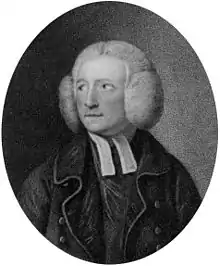Sneyd Davies
Sneyd Davies (1709–1769) was an English poet, academic and churchman, archdeacon of Derby from 1755.

Life
He was born on 30 October 1709. His father, John Davies, was rector of Kingsland, Herefordshire, and prebendary of Hereford and St. Asaph. His mother, Honora, was daughter of Ralph Sneyd, and married, first, William Ravenscroft in 1690, who died in 1698, and secondly, John Davies, by whom she had four children, Sneyd being the second son. He was on the foundation at Eton College, and later became scholar and fellow of King's College, Cambridge.[1] At Eton he made the acquaintance of Charles Pratt, who also became a Fellow of King's College, and of Frederick Cornwallis.
Davies wrote poems at school, and was noted for scholarship. His father died in 1732, and left him the advowson of Kingsland. Here he settled, and led the life of a recluse, keeping up occasional correspondence with Pratt, Cornwallis, and other college friends. His particular crony was Timothy Thomas, rector of Presteigne, in his neighbourhood, who joined him in translating the Essay on Man into Latin verse; he died, aged 59, in 1751.
Cornwallis, on becoming bishop of Lichfield in 1749, appointed Davies to a chaplaincy, and later appointed him master of St. John's Hospital in 1751, prebendary of Lichfield, and in 1755 archdeacon of Derby. Davies became known in the literary circles of Lichfield; Anna Seward, then a girl, thought him a spirit "beatified before his time". Davies was interested in further preferment, but when Pratt as Lord Camden eventually offered him a small living in the neighbourhood of Kingsland in 1768, Davies's health was breaking, and he died on 20 January 1769 aged 59.
Davies left the living of Kingsland and his whole fortune to Richard Evans; he was the nephew of his brother-in-law Henry Morgan of Henblas.[2]
Works
Davies's poems were not collected. They included Latin verses, imitations of Horace's epistles, serious and burlesque imitations of John Milton, and verses in the manner of Jonathan Swift. Some of them were published anonymously in two volumes of poems (1732 and 1745) by John Whaley, also a fellow of King's College.[3] These and other poems by Davies are in James Dodsley's Collection (1775), and John Nichols's Collection (1780). Thomas Pennant's Tour in Wales contains a poem on Caractacus, delivered at an annual meeting on Caer Caradoc. One poem is in the fourth volume of William Duncombe's Imitations of Horace, which is dedicated to Davies. Others are in the life of Davies, by George Hardinge, in the first volume of Nichols's Illustrations of Literature.
Some letters, really written by James Davis and called Origines Divisianæ; or the Antiquities of the Devizes, in familiar letters to a friend (1754), have been attributed to Sneyd Davies.
References
- . Dictionary of National Biography. London: Smith, Elder & Co. 1885–1900.
Notes
- "Davies, Sneyd (DVS728S)". A Cambridge Alumni Database. University of Cambridge.
- Charles Croslegh, Descent and Alliances of Croslegh, or Crossle, or Crossley, of Scaitcliffe (1904) p. 349; archive.org.
- Whaley, who was Horace Walpole's private tutor, was in financial difficulties, and Davies gave him the poems by way of charity.
External links
- Attribution
![]() This article incorporates text from a publication now in the public domain: "Davies, Sneyd". Dictionary of National Biography. London: Smith, Elder & Co. 1885–1900.
This article incorporates text from a publication now in the public domain: "Davies, Sneyd". Dictionary of National Biography. London: Smith, Elder & Co. 1885–1900.